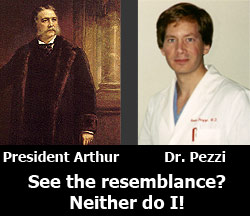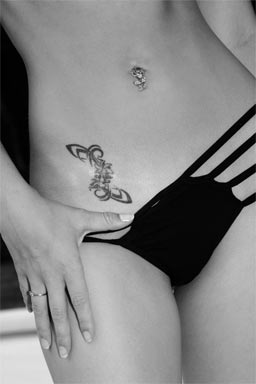Pros and cons of being an ER doctor: Part 1
Q: My Uncle is a veterinarian and he is trying to persuade me not to go into a medical field because of the long hours and low pay. What do you think?
Thanks for all your help,
Jaclyn
Answer by Kevin Pezzi, MD: He has a good point. The hours are indeed very long. Just to become a doctor, I worked more hours than some people do in their entire lives. I gave up 99.9% of my personal life for over a decade as I focused on becoming the best possible doctor I could. I realize that all medical students are not that dedicated and do find the time for some R&R, but even they work very long hours.

Family times are irreplaceable
If you become a doctor, you will inevitably make sacrifices that most other people do not. I missed the wedding of my best friend, and I missed countless holidays and special events with my family. My Mom died two years ago of cancer. After her death, I went through her mountain of photos to make a photo CD that I passed out at her funeral. Seeing those photographs was a very poignant experience for me, because I saw obviously joyous family reunions and holiday celebrations that I had not only missed, but never even knew about! What I wouldn't give to relive those days again! But once they're gone, they are gone forever.
The decade or so after high school can be some of the best years of your life. (Tip: Youth comes with an expiration date, so make the most of those years!) If you decide to become a doctor, those years are primarily spent studying 18 hours per day or taking care of people who often aren't very fond of bathing. I hate to be so blunt about it, but it's the truth. There are exceptions, but medical students and residents see a much greater proportion of patients who are alcoholics, drug abusers, mentally ill, homeless, permanently unemployed, or criminals. During medical school and residency, I had a grand total of one patient who could tell me the name of the prescription drug she took, its dose, and why she took it. The rest of the patients either didn't have a clue, or would say something like, "I'm on the blue pill." Why? "'Cause I be sick." (Here is the rest of that story that is, unfortunately, completely true.)
Even if you are very dedicated about helping the less fortunate members of our society, it is very easy to grow weary of doing that and to become frustrated and burned out. I think that most normal people crave interactions with other normal people, not adults who urinate while sitting in a chair without bothering to get up, for example. You want to do good and see results, but many of your patients are difficult to manage and exceedingly resistant to change. Helping them is like turning lead into gold. The dreams of an alchemist, shattered once again.
People who become doctors are usually ones who like to see positive outcomes instead of going through the motions just to get a paycheck—those folks gravitate toward civil service careers, thanks to one of my relatives, Chester Arthur, President of the United States from 1881 to 1885. (In truth, I was just being flippant [it's late and I am tired], because the civil service system, for all of it faults, is a vast improvement over the nepotism and cronyism that preceded it.) Seriously, your efforts to help people will often be thwarted for myriad reasons, many stemming from patient noncompliance and the fact that you as a doctor often cannot do much to save people who seem hell-bent on destroying themselves and often others around them.

Don't reach for a bottle of Prozac just yet, because it will get better. After your residency, you will become an attending physician and have the freedom to move to more upscale areas. You will still see many lowlifes in the ER (docs and nurses usually refer to them as scumbags or dirtbags), because emergency departments are a magnet for them. Those people are statistically more likely to be the victims of violence or to have bad habits (smoking, drinking, using drugs, and sleeping with the wrong partners, sometimes all in the same night) that creates a need for more frequent medical and surgical care. Those patients are often uninsured, so they tend to use the ER as a sort of family practice center for everything from colds and diarrhea to warts and lice. I've worked in ERs in upscale areas in which I had a world-famous celebrity as a patient in one room and a town drunk in the next one. That's the nature of ER.
In a nutshell, becoming a doctor is grueling, and being a doctor (especially an ER doctor) isn't the bed of roses that you might imagine. While the job is frequently hellacious, it can also be far more rewarding than other jobs. What other job gives you the ability to save lives on a regular basis? What other job gives you the chance to forge emotional connections with people who were strangers five minutes ago? I've had many patients reveal things to me they said they'd never told their own doctor or even spouse. If you have a knack for dealing with people, they will open up to you in remarkable ways. That instant candor can help you help them. As an ER doctor, you will also have the opportunity to meet and get to know thousands of people per year. Waitresses and salesmen might meet a similar number of people, but their interactions are usually superficial and even stereotyped. In my opinion, that is not very rewarding.

Patients often reveal much more
than their hidden tattoos to ER doctors who
are approachable and easy to talk to.
As an ER doctor, you will see things that most people never witness (although I give you a ringside seat in True Emergency Room Stories). As others sit at desks and push paper from one pile to another, you will be experiencing lower lows and higher highs. You will meet people who want to kill you, and others who want to name their child after you. Speaking of gratitude, you will also have people of the opposite sex throw themselves at you (for real-life examples of this, see my Love & Lust in the ER e-book; you can download it free, or read the stories on the www.ERlove.com site). You will also be showered with gifts (see my True Emergency Room Stories book), and have other priceless experiences (here are a few of mine). You will hate your job some days, and love it on others. If you like to talk about what you do, you can be (as I've been) interviewed by countless radio and TV stations, newspapers, and magazines. That exposure will lead to things you probably could never imagine. As just one example, I watched The Brady Bunch on TV when I was a child. Susan Olsen, who played Cindy on that show, interviewed me years later on Comedy Central. I also became friends with a woman who is a friend of Katie Couric (then the co-host of the Today show; now the anchor of the CBS Evening News), and she offered to set me up on a date with Katie (if you're interested, here's the rest of that story).
In the end, is it all worth it? I cannot make that decision for you. Many doctors regret going into medicine, while others can't imagine doing anything else.
Related: April 21, 2023: She checked into the ER and was discharged. Then she got in her car, Florida cops say
Comment: She smashed her car into the ER. I worked at a different hospital in which someone drove up and fired bullets into the emergency department through its entry doors. Another day, another oddball who assaulted a staff member, breaking one of her bones. Another hospital: a patient was murdered in his bed by a rival. Same hospital: a doctor who'd had enough jumped out of a window, falling to his death, adding to the long list of doctors who are burned out, depressed, or suicidal.
My Mom grew up during the Great Depression and couldn't understand why doctors with fancy titles, job security, and big paychecks weren't happy being doctors. From the outside looking in, that is understandable but having worked as a doctor in the ER — arguably the most grueling specialty that precipitates burnout — I know exactly why I was willing to work even harder to get out of medicine than I did to get into it.
Continue reading about this topic: Pros and cons of being an ER doctor: Part 2. Be sure to read the update at the end—you'll love it!
Back to the main Question & Answer page
